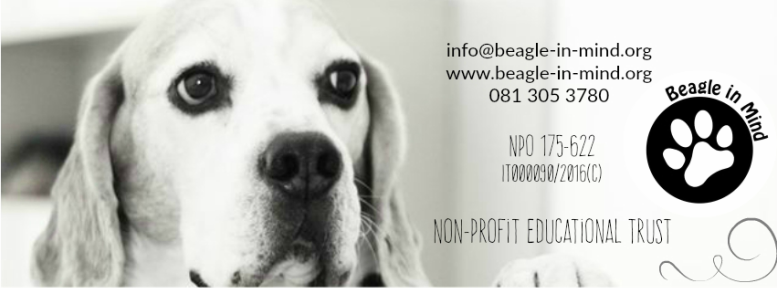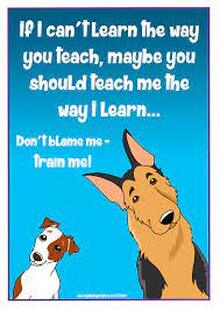Being owned by a BeagleThe biggest "pitfall" we find when speaking with Beagle owners that approach us is that there is this limbo between old school beliefs vs having experienced "something different". We were there as well and the Beagles taught is very quickly that they are different. And no, we have also not been able to give a definitive answer as to why they are different (to those looking for the answer to that question) and no (to those saying "oh, just like any dog") they are not. It's not Beagle snobbery at play when a Beagle owner tells you it's different being a Beagle parent, it - just - is. The closest thing we have come to be able to try and explain it is: "It's like raising a highly intelligent, curious (& very hungry) 5 year old"The unspoken languageBody language. It has been touted for a while by behaviourists and trainers, there are many many articles, blogs and books on it. We won't get into those nitty gritty's right now for various reasons. The reason for this blog post is to make you aware of the importance of it. Most people have heard of it but it has become a buzz phrase of sorts. We expect our dogs to listen to us, shouts, calls, whistles, towering over them when angry, to know the difference between us being happy and frustrated, the list goes on. But how much time do we take to understand them, how they think, why they do things. How much do we ASSUME about their behaviour (prime example: "I know he knows he did something wrong because he looks guilty when I scold him")
Understanding your BeagleI will get to points 1-3 in other posts. This one is about the importance of understanding your dog. Again, I'm not going to be telling you here how to understand your dog for the moment. We want to hit home how important this is. You may think you understand your dog but still run into issues. So I would like to list for you the biggest (human) issues we run into when consulting, do you recognise any of these being your problem? Ego Yip, I start with the hardest one for people to hear. It actually goes hand in hand with point 1. Mindset change. We find that people battle most with their ego when they need to change their mindset. Various things such as preconceived ideas, how they grew up, cultural beliefs, things seen on television, old belief systems all affect this as changing a mindset usually means facing these things were incorrect (and who wants to admit what they've believed/practiced is incorrect and possibly even caused the unwanted behaviour?) We have walked a path with many people where the path of changing unwanted behaviour ends up being a bigger journey of self awareness (more about that another time), for this the ego needs to be dropped. Ignorance Despite all the information "out there" many people have not educated themselves in the many new and more constructive ways of training and understanding their dogs. Many people still have not done their research on the breed they are getting (though this is definitely changing thankfully). Sometime the research hasn't been done just because they did not bother but very often we find it is because people are simply overwhelmed by the information and sometimes very contradictory or very generalised information, so they shut off and stop looking. Stubbornness Kicks in with ego. They dig in their heels because "it's a dog and needs to do what it's told". In my experience as an animal behaviourist the Beagle breed is one of the ones where I see this human mindset backfire most often. They will compromise but very often will not submit completely. Laziness I've mentioned it before and I'll mention it again. There is work that needs to be done if you want to change a behaviour. At times that means simply working on your relationship with your Beagle. Other times (depending on the behaviour and the severity) it can take weeks, months, even years to change it. Impatience We tend to stick our own expectations of timelines regarding behavioural changes (often without being willing to put in the work or compromise needed). Just because they are dogs it does not mean they can simply change at the snap of your fingers. Think about it, how long does it take for you to break that bad habit? Know how to listenIf you can take one thing away from this post we implore you, educate yourself. Understand how your dog thinks and why, not with books and articles (that can come)....
Step back and let go of all your preconceived notions and sit quietly with them and observe and interact. Watch them, see how they think, don't make assumptions. Look at them with fresh eyes and TELL them you want to understand them and their way of speaking when they look at you with that Beagle head tilt quizzically. Let us know what you observe, we'd love to hear it.
1 Comment
3/7/2024 10:36:19 pm
I wanted to express my gratitude for your insightful and engaging article. Your writing is clear and easy to follow, and I appreciated the way you presented your ideas in a thoughtful and organized manner. Your analysis was both thought-provoking and well-researched, and I enjoyed the real-life examples you used to illustrate your points. Your article has provided me with a fresh perspective on the subject matter and has inspired me to think more deeply about this topic.
Reply
Leave a Reply. |
ALTERNATIVE HEALING & BLOG DISCLAIMER
Alternative healing articles and any other advice featured in this blog do not claim to replace any conventional veterinary treatment. This is an educational blog for Beagle owners to read about alternative options that we as Beagle owners have tried ourselves and seen positive outcomes. We do not post anything we have not experienced positively and will never endorse anything in which we do not believe through positive experience. Kinesiology and other healing modalities do not diagnose, cure or prescribe, as these activities are the prerogative of veterinarians. Kinesiology may provide a different, energy-based approach to allergy support, and potentially allow for a reduction in the use of corticosteroids. As a kinesiologist, I believe that allergies, just like other ailments, may have an emotional and/or mental aspect which is worth addressing. As such, this modality represents a valid complementary therapy to veterinary care. Categories
All
|
Proudly powered by Weebly







 RSS Feed
RSS Feed